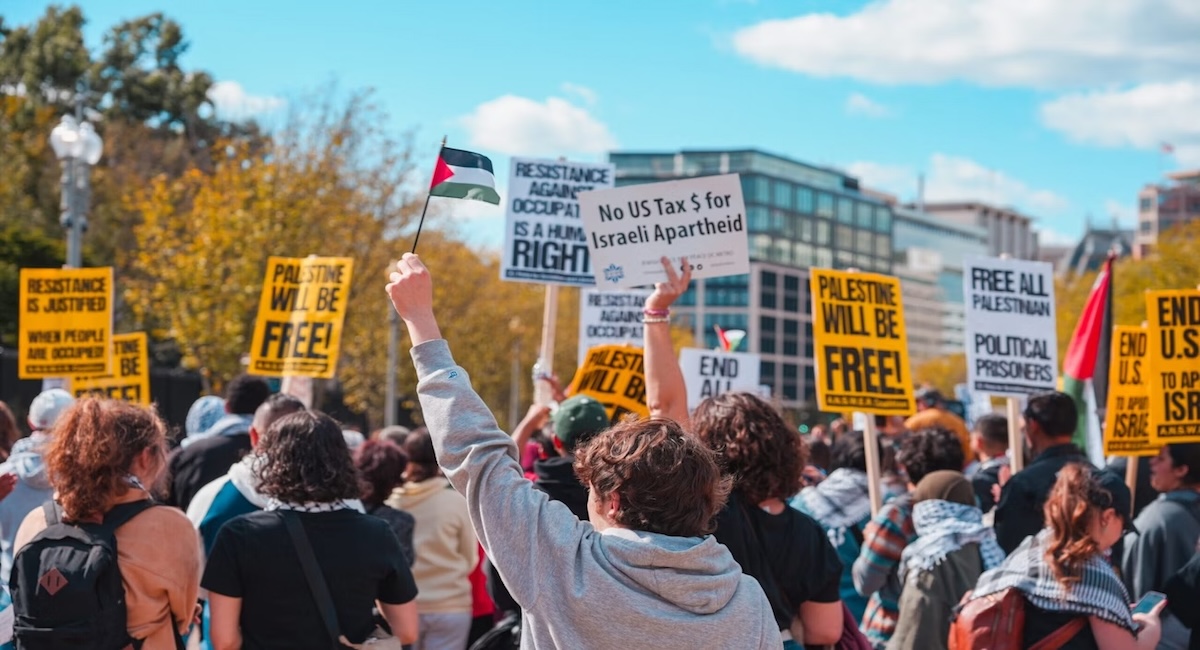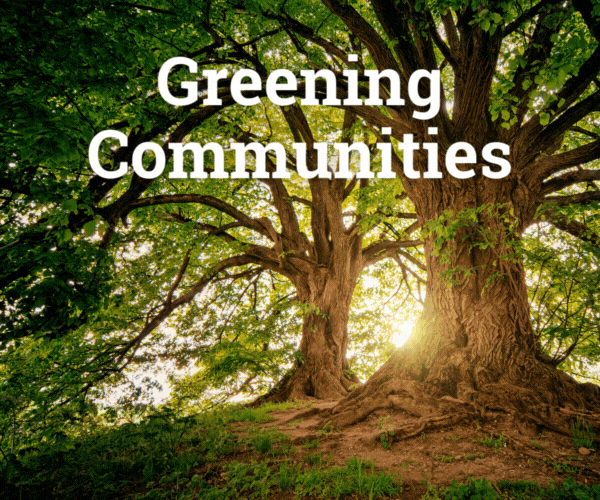Students involved in the movement for Palestine say they are not backing down despite ongoing pressure from the government and university administrators. Many insist the crackdown on student activism is in fact hardening their resolve.
Their stance comes as Israel’s war in Gaza continues, with reports of widespread famine among Palestinians, and a shooting in Washington DC that killed two Israeli embassy staffers.
Palestine Legal, a nationwide organization providing legal resources to student activists, is reporting that they received over 2,000 requests for legal support in the last year—nearly double the number they received in 2023. For context, in 2022, they received only 290 requests for legal support.
Nearly two-thirds of all reports were campus-related, from people targeted for their Palestine-related advocacy, including over 100 reports at K-12 schools.
2024 also saw a significant increase in incidents related to federal investigations and sanctions targeting university administration—Palestine Legal received over 580 such reports, more than five times the year prior.
Tensions over Israel’s war in Gaza—which according to conservative estimates has claimed more than 53,000 lives—continue to escalate. On May 21, a Chicago man shot two Israeli embassy staffers in Washington D.C., later telling officials he “did it for Gaza.”
The shooting, which is being investigated as a hate crime, comes as students across several California State University campuses and Stanford University are nearing two weeks into a hunger strike for Gaza, continuing demands including that universities cut business ties with Israel.
The Students for Justice in Palestine (SJP) chapter at Occidental College in Los Angeles was one of the first to initiate a hunger strike, along with CSU Long Beach and Chapman College.
Occidental freshman and Palestine Legal client Evan Zeltzer was among them.
“We found it to be an effective way to garner media attention, and some universities are now getting their demands met through hunger strikes. They’re trying to employ tactics that are less easily repressed whether that’s because of difficulty in repressing them or just because of visibility.”
Five days after their hunger strike began, Occidental students staged a protest at the inauguration of the new school president. Zeltzer says the response from campus security was violent, to the point where they felt they had to abandon the hunger strike and seek legal advice from Palestine Legal.
“There’s a video on the OxySJP Instagram where you can see people having their hair grabbed, being pushed down the stairs, and just kind of like an unprecedented level of violence against students on our campus,” said Zeltzer.
‘A moral obligation’
Sophomore Satya Zamudi is a classmate of Zelzter’s at Occidental. She says as a Jewish person, the conflict in Palestine has always been a focus of her activism, and the most significant issue of this generation.
“People feel this moral obligation to continue organizing, continue fighting. The school is creating these conditions where we have no choice but to escalate in order to be heard and to be taken seriously and to make change happen.”
Occidental College defended its actions in an email response to AcoM. “While Occidental College continues to support and uphold students’ rights to peacefully protest, the events that occurred during the Inauguration ceremony were not peaceful and fell far outside the boundaries of acceptable conduct.”
Berry, a University of San Francisco student who asked to remain anonymous, described a similar scenario.
“They have absolutely made it extremely difficult for any pro-Palestine organizers on campus,” said Berry.
On April 29, University of San Francisco announced to protestors that they planned to divest from four U.S. defense companies that have contracts with the Israeli military. As a major demand of last year’s encampment, this was seen as a win. But the news came just hours after the university called SFPD on five students, including Berry, demonstrating in the campus library.
In an email, a university spokesperson said the school acted to ensure “the USF community had safe access to the library,” adding student protestors “were given four warnings by university staff before officers arrived” and that “No protesters or students were detained.”
In an earlier statement school officials said the divestment decision was made well before the demonstration.
“If they didn’t feel threatened as an institution… then they wouldn’t go to all of these lengths to try to silence our voices, to try to repress our actions,” said Berry, pointing to the banning of Students for Justice in Palestine on campus, changes to the student code of conduct that make it harder to demonstrate, and tightening of ‘time, place, and manner’ rules following last year’s encampments.
“They made it so that students face penalties and face disciplinary charges if they are to organize outside of what the university deems is appropriate.”
School tactics backfiring
Senior attorney for Palestine Legal, Tori Porell, represents students like Berry. She says a big challenge is how universities are adapting to the students’ tactics.
“The repression is evolving. For example, a lot of campuses changed their policies for protests after the encampments in the spring – for the fall. A lot of campuses instituted mask bans, they put limits on when protests could be held, where protests could be held, or what days of the week. And so the terrain for students to operate on is just getting smaller.”
But Porell adds such tactics are having the opposite of their intended effect, and that she thinks part of what is driving many students is the repression itself.
“Students who may have cared about Palestine but not been the most active or committed… once they hear that universities are calling the police on their classmates, or their classmates are being brutalized on campus, or facing interim suspensions without process, or being prevented from organizing events – that is radicalizing for a lot of students.”
She continues, “I think the repression of this activism has really backfired on university administrators.”
While she is currently defending student activists in court, back in 2014 Porell herself was on the other side of the bench. As a student activist at Northeastern University in Boston, she was an early client of Palestine Legal when their Students for Justice in Palestine chapter was suspended over flyering in the dormitories.
She says back then, Northeastern SJP was among the first chapters that had seen suspension, but they were able to beat the charges and reverse the decision. Today, it’s not so uncommon.
“This was seen as a really big escalation for a university to suspend a chapter,” says Porell. “But at this point, we know of probably a dozen SJP chapters that have been suspended or banned at universities across the country. Or universities just not allowing students to form SJP chapters at all.”
Porell points to UCLA as an example. The school saw violent counter protests during last year’s encampments. Several students are still going through disciplinary processes at UCLA, despite the city attorney in Los Angeles announcing recently that there won’t be any criminal charges brought against any of the students arrested at the encampments.
“UCLA has doubled down and just refused to drop the conduct processes,” notes Porell. “Even the few students that have had hearings so far, there’s been insufficient evidence to find them responsible for the charges that they’ve been accused of.”
The Trump Administration, meanwhile, is threatening to withhold federal funding from Harvard as it continues its pressure campaign on elite universities it accuses of fostering “anti-American, pro-terrorist agitators.” Green-card holder Mahmoud Khalil, the Columbia University grad-student and activist, remains imprisoned in Louisiana after more than two months.
‘Our generation’s greatest shame’
Ema, who asked not to use their real name, is an undergraduate transfer student at UC Berkeley studying ethnic studies and sociology. Ema came to the United States at 6 years old from Mexico and is a green card holder and says the main reason students continue organizing for Palestine is a moral one.
“It’s our generation’s greatest shame,” said Ema. “I’ve had this conversation with my parents, if I were to get expelled, I’d take that with pride.”
Ema has also consulted with Palestine Legal and immigration lawyers and says plans to apply for citizenship are on hold as a result.
“I was going to start that process, but I was actually advised not to because, right now, if I try to get my citizenship it would put me on their radar,” Ema says. “I’m constantly looking out my window. Constantly waiting, because not only am I a student organizer, but I’m an immigrant too.”
Image credit: Ted Eytan. Published under CC license ShareAlike 4.0





